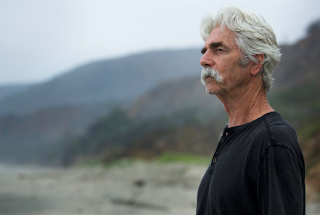Opening wide in the Valley
this week:
The Hero—Last Friday, in
my review of The Exception, I asked
if any actor since Paul Newman has aged as well as Christopher Plummer. I meant
the question rhetorically, but if somebody had countered it by suggesting Sam
Elliot, I would have had to admit that, yeah, even allowing for the fact that
he’s more than a decade younger than Plummer, the ol’ cowpoke is aging pretty
spectacularly.
Pretty much the walking
definition of the word “lanky,” Elliot has been around since the late ‘60s—his
feature debut was a small role in Butch
Cassidy and the Sundance Kid. He did studly, lackadaisical leading-man work
in stuff like Frogs (1972) and the
underrated Lifeguard (1976) and
copious TV, including a season on Mission: Impossible. In the ‘80s, he appeared
in many TV-movie and mini-series westerns, and the older he’s gotten—and the
bushier his mustache has gotten—the more he seems like he was born for that
genre.
He plays the title
character in this drama. Or rather, he plays the actor who played the title
character, in the only movie of his career, he says, that he’s proud of.
Lee Hayden is a has-been,
pothead western movie and TV star. His career these days consists mostly of tedious
voice-over work, in his beautiful deep rumble, for barbeque sauce commercials.
Long divorced, he’s semi-estranged from his ex (Katharine Ross) and daughter
(Krysten Ritter), but he has a vaguely father-son relationship with his
washed-up-actor pot dealer (Nick Offerman), and while he’s underemployed, bored and not without regrets, his life isn’t unpleasant.
Or, rather, it would be
pleasant, if it weren’t for that pesky pancreatic cancer diagnosis.
Directed by Brett Haley
from a script he wrote with Marc Basch, The
Hero traces how Lee’s condition, which he initially hides from his loved
ones—he keeps coming up to the brink of telling them, and then chickening out—haunts
his spaghetti-western-style dreams. We’re also shown his romance with the
pearlescent Charlotte (Laura Prepon), around half his age, who shows up at the
dealer’s house and takes a shine to Lee. She’s his date at a dinner at which he
is given a life-achievement award, and from which a video of his drug-fueled acceptance
speech “goes viral.” He suddenly, to his great confusion, finds himself back on
the pop-culture radar.
Charlotte’s not the sort of woman who turns
up every day, and Lee’s life isn’t like most people’s lives. For a while, I
couldn’t help but wonder how I was supposed to feel too sorry for a guy who, at
71, gets to live in a lovely beach house, be given life achievement awards and
go to bed with Laura Prepon. But of course that’s the point. Age and illness
have a way of screwing up people’s lives just about the time they’re starting
to learn how to live them properly—to know what’s really important.
It would be a mistake to
dismiss the effortless grace of Elliot’s work here on the grounds that he’s
“just playing himself.” First of all, he isn’t—Elliot has done plenty of
voice-overs, certainly, but he’s never qualified as a has-been. If anything,
he’s become more relevant as he’s gotten older. Admittedly, he’s sometimes been
used semi-ironically—a slice of ‘70s beefcake that aged unusually well into a sort
of hunk emeritus in films like The Big
Lebowski and Up in the Air. In his
one brief scene in 2015’s Grandma, however, he showed he could go deeper
than this, giving a startlingly focused, emotional performance, maybe the best
of his career.
Or, rather, maybe the best
of his career until The Hero. Haley’s
directorial touch is low-key, but the tension between Elliot’s iconic cowboy
image and the character’s fear and sadness, his intense desire to live longer,
is moving.




No comments:
Post a Comment